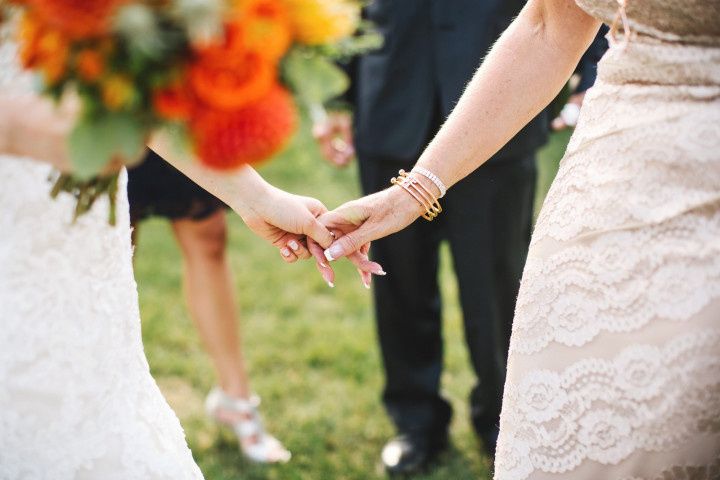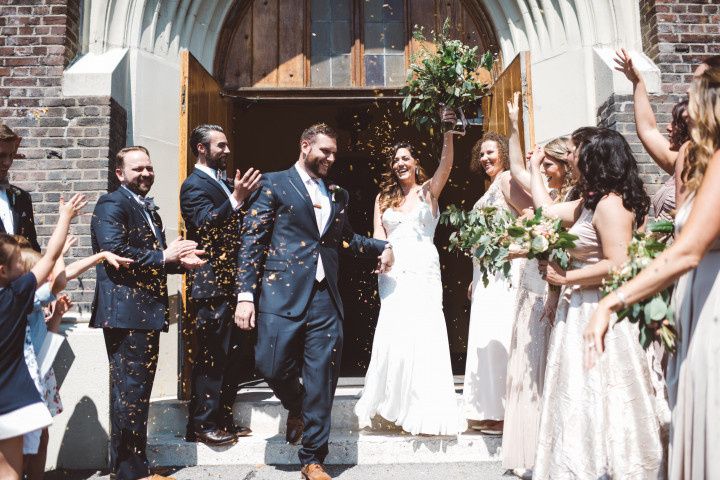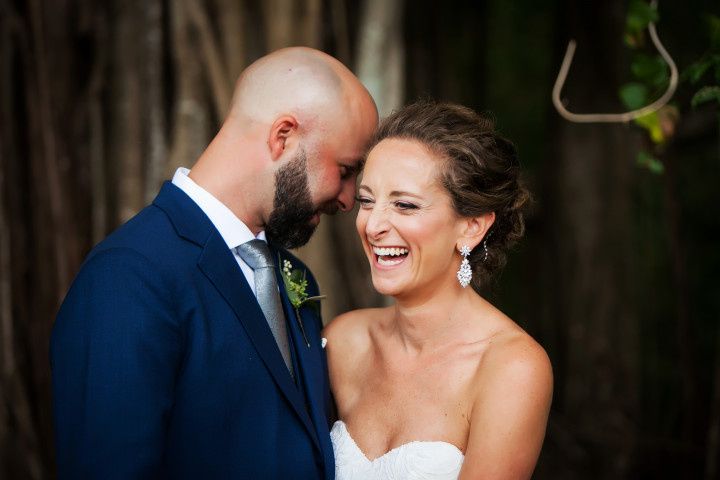The 8 Most Common Financial Mistakes Engaged Couples Make
All too often, engaged couples make financial mistakes that affect their future. Here's how to avoid these common money issues.


Planning to marry the love of your life is a special moment in time. You’re both filled with exciting hopes for what the future will bring, and you’re having plenty of conversations to ensure your relationship is healthy and happy during a stressful period. But while couples understand the benefit of premarital counseling and learning to compromise on ‘wants’ and ‘needs’ for the big day, too few sit down with a glass of wine and crunch numbers, considering all of the financial mistakes couples can make. Considering the average wedding in the United States costs a whopping $30K, the grand affair comes at an expense.
To avoid disagreements, debt and other issues, avoid these financial mistakes during your engagement.
Not setting boundaries from the beginning.
Before you begin your wedding planning, you may already make a huge mistake: not setting boundaries. Here’s the deal: the decision to join your lives together isn’t merely about forever-and-ever and true love. It’s also about the practical parts of creating a future: will you buy a home in the next five years? Have a baby? Travel? To kick off your wedding — and thus, your marriage — Manisha Thakor, CFA, CFP and Tally’s personal finance expert recommends couples to discuss specifics ASAP. “Make sure both parties have some clearly delineated fun money and some mutually agreed upon guard rails to keep either of you from going over the financial edge,” she continues.
There are a few ways to logically tackle your boundaries, depending if you have a shared account or separate accounts. Regardless, it’s important to set up what Thakor calls ‘The Financial 3-Way’, where there are funds for ‘ours’, ‘yours’ and ‘mine.’ “You decide together what expenses are to be paid out of the ‘ours’ bucket and then each of you can spend from your own buckets as you wish,” she explains. “Whether everything is ‘ours’ or you have ‘yours’ and ‘mine’ accounts, the key here is that each person has the freedom to do some spending no questions asked.”
Having an unrealistic registry.
Since they were first introduced by Macy’s half-a-century ago, wedding registries have changed dramatically. Originally intended as a way to pick the china you wanted for your household, couples now use them for everything under the sun: their honeymoon, a car or house fund, and beyond. Though they can be beneficial for duos, it’s important to ensure you ask for items you actually need. As lead planner at Facet Wealth Hali Londond, CFP explains, a registry should add value to your lifestyle now, and moving forward. “If neither of you love to cook, a large set of expensive knives is not going to change that. On the other hand, if you love to camp, an expensive cooler might be a great long-term investment,” she continues. “Remember, your guests want to shower you with gifts you will use.”
Inviting people out of obligation.
When you sit down with your one-and-only to discuss the guest list, you’ll probably end up looking at one another in awe, wondering how you know so many people. It’s easy to get into the mindset of having to invite everyone: from your high school English teacher you’re friendly with to that second-cousin you haven’t seen in a decade—but that may turn out to be a big financial mistake. As uncomfortable of a conversation it may be, decide together to only extend an invite to those people who you really, truly want at your wedding, suggests the vice president and general manager of The Balance, Lauren Silbert. “Your mother ‘has’ to invite your childhood neighbors, your co-worker wants to bring his new girlfriend, and your cousin can’t find a sitter for their three kids. Set some clear rules about your guest list: like no kids or plus ones unless you’ve been dating for over a year,” she continues. “There will always be exceptions but minimize them, so things don’t start snowballing out of control.”
Not reading contracts thoroughly.
While it’s a dreamy experience for men, weddings are also a business. And contracts are binding. So simply signing on the dotted line without asking questions? That’s a big financial mistake, according to credit card industry expert, Greg Mahnken. That’s why you should understand every last line before you opt-in. As he explains, some couples end up paying far more than they thought they bargained for because they weren’t schooled on the fine print. As an example, he says if you’re reserving a block of hotel rooms, be sure to understand how the hotel handles unsold rooms. “Some contracts leave you financially responsible for unsold rooms that were reserved for your event. If this is the case, you may be able to block off fewer rooms at a time, and only add more when you are confident that more guests will commit to that hotel,” he shares.
It’s also smart to look at the total cost that includes service fees, taxes and suggested gratuity. And if you’re hiring vendors like DJs or photographers and you want very specific things, get it in writing, he suggests.

Not factoring in the little — and unexpected! — expenses.
You’ve booked the venue, the photographer, the flowers, the food and everything else on your list. Now, you know exactly what you’ll be spending for your wedding. Or do you? Londond says having a back-up fund for the seemingly-small expenses that tend to sneak up on couples. While an extra $10 per person might not break the bank, but before you know it, you receive a bill that you definitely didn’t budget for. When you’re going line-by-line, create some wiggle room, Londond recommends.
Spending more than you have on the wedding.
Everyone wants their wedding day to be a rose-colored memory that was full of love, excitement and romance. So when tempted between two options — wallet-friendly and over-budget — many will splurge because ‘you only get married once!’ Here’s the deal though, going into debt to wed is never the right foot to start your marriage on. Especially since lead planner at Facet Wealth Brent Weiss, CFP says one of the leading causes of divorce are finances. “Many couples carry some debt when they get married, and this is normal. However, creating new debt at the time of marriage can prove to be yet another point of stress that sets couples back financially,” he explains.
Rather than handing over a credit card, Weiss suggests having a longer engagement to save up funds if you aren’t in the right position to spend thousands. “This takes time but is the single best thing couples can do,” he continues. “But if you do it right, you will have a more enjoyable first year of marriage. Those close to you will appreciate that you still want them to be a part of your marriage but are trying to be cost appropriate.”
Not budgeting gratuities for all your vendors.
When you go out for an engagement dinner to celebrate your ‘yes’, you probably tipped your kind waiter big-time. And for those round of drinks with friends? Same. Much like you pay gratuity for these experiences, wedding vendors are no different. Even so, Silbert says many couples forget to budget for the extra percentage—a major financial mistake. Forgetting this small figure is a big no-no, since it could easily be a thousand — or more. “Get a clear headcount of everyone that will be working during the wedding when you’re signing your contracts so you can put those tips into your budget,” she explains. “Yet the money aside in envelopes and give them to a close family member or wedding coordinator to give out the day of the wedding so you don’t forget in all the chaos.”
Thinking your gifts will cover the cost of the wedding.
While traditionally, gifts are meant to cover the cost of the couple (or their parents) spend on the wedding, in modern affairs, this just isn’t the case. In fact, Silbert says putting that unspoken pressure on your guests can leave you disappointed — and also in the hole, majorly. “Your wedding budget should only cover what you can actually afford without any gifts from guests. This way you know you’re protecting yourself and will be happy with whatever you get as a present, even that strange off the registry gift your whacky aunt gave you,” she adds.





